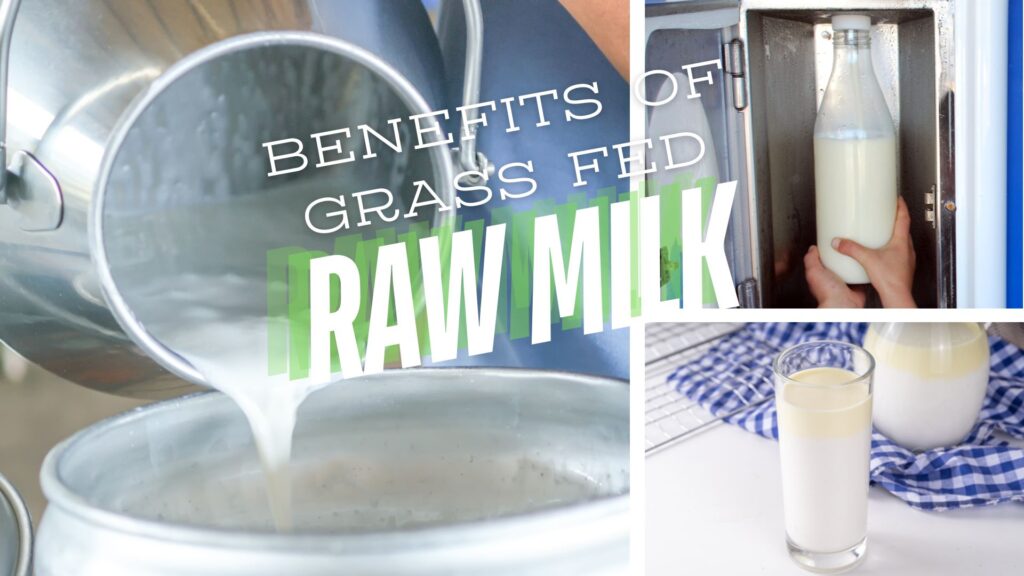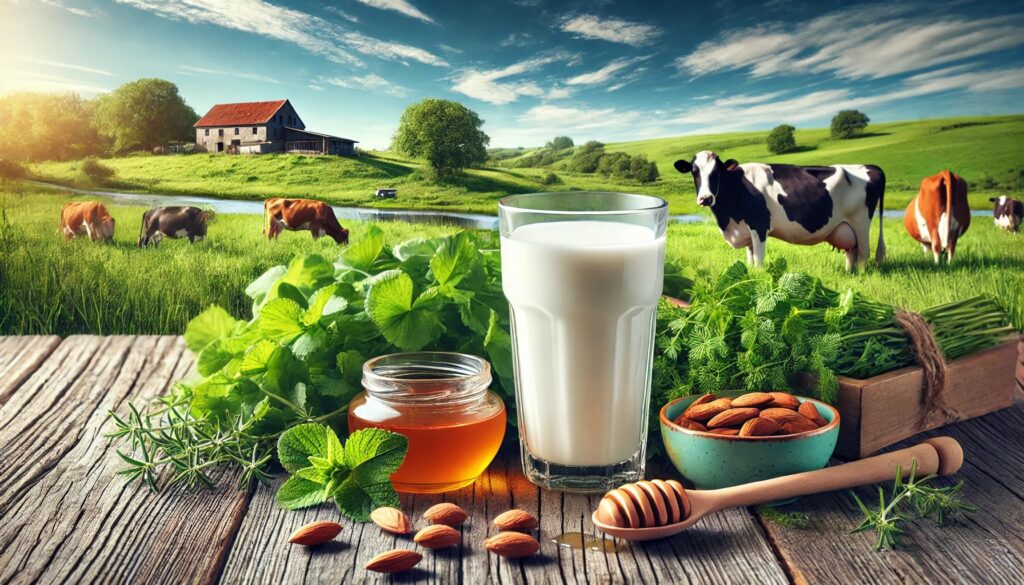
For centuries, humans have thrived on raw, unpasteurized milk. It was only in relatively recent history, during industrialization, that the practice of pasteurization became widespread. But is pasteurized milk really healthier, or have we been misled into thinking so? The truth is, raw milk is packed with natural enzymes, beneficial bacteria, and vital nutrients that pasteurization strips away. This article explores the many benefits of raw milk, the downside of pasteurized milk, and the historical context that led us down this path of dead, nutrient-deprived milk.
A Brief History: When Milk Turned “Unhealthy”
Before the rise of modern industrial farming, milk was consumed raw, fresh from the cow, and without controversy. It wasn’t until cows were crowded into dirty, polluted urban environments and fed poor-quality feed, such as brewery waste, that milk began to pose health risks. The decline in cow health and milk quality in these unsanitary conditions led to widespread illness. Instead of addressing the root causes—poor nutrition for cows and unhealthy living conditions—regulators decided to blame the milk itself.
The solution? Pasteurization. By heating the milk, harmful pathogens were killed, but along with them, the beneficial bacteria and enzymes were also destroyed. This process made milk safer in the short term, but it compromised the nutritional integrity of the milk, leaving behind a product that is not as wholesome or beneficial as the raw version.
The Downside of Pasteurized Milk
Pasteurization, while effective at killing harmful bacteria, also eliminates many of the enzymes and good bacteria that are vital for digestion and overall health. These beneficial microbes are essential for maintaining gut health, supporting the immune system, and aiding in the proper breakdown of nutrients. When milk is pasteurized, these important components are destroyed, and what remains is often referred to as “dead milk.”
For many, pasteurized milk can also be a source of discomfort. Because pasteurization destroys the enzyme lactase, which helps digest lactose, many people develop lactose intolerance when drinking pasteurized milk. In fact, it’s not that people are allergic to milk itself—they’re allergic to the pasteurized, nutrient-deprived version of it. Raw milk, on the other hand, retains its natural enzymes, making it easier to digest, even for those who have difficulty with lactose.
The Benefits of Raw Milk
Raw milk is a powerhouse of nutrition, containing a wealth of vitamins, minerals, and beneficial compounds that support human health:
- Probiotics: Raw milk is rich in beneficial bacteria that promote gut health and support the immune system.
- Enzymes: Raw milk contains enzymes like lactase, which aids in the digestion of lactose, making it more digestible than pasteurized milk.
- Vitamins: Raw milk is a source of essential vitamins such as A, D, K, and E. Vitamin A is vital for eye health and immune function, while vitamin D helps with calcium absorption, critical for bone health.
- Minerals: Raw milk is loaded with minerals such as calcium, magnesium, and phosphorus, which are crucial for strong bones, muscle function, and overall metabolic health.
- Omega-3 Fatty Acids: Unlike pasteurized milk, raw milk from grass-fed cows contains higher levels of omega-3 fatty acids, which are essential for heart health and reducing inflammation.
- Conjugated Linoleic Acid (CLA): Raw milk contains CLA, a fatty acid that has been linked to numerous health benefits, including improved immunity and reduced risk of heart disease.
These nutrients, when consumed in their natural, unaltered form, provide a wide array of health benefits. From improving gut health to supporting stronger bones and muscles, raw milk is a complete, nutrient-dense food that can be a valuable addition to your diet.

Supplements and Alternatives for Non-Milk Drinkers
If you don’t consume milk but still want to get some of the same nutrients, here are several supplements and foods that can help you achieve similar health benefits:
- Calcium:
- Supplements: Calcium citrate or calcium carbonate. CLICK TO BUY ON AMAZON
- Food Sources: Dark leafy greens (like kale and spinach), sardines, almonds, and sesame seeds.
- Vitamin D:
- Supplements: Vitamin D3 (cholecalciferol) is more effective for absorption. CLICK TO BUY ON AMAZON
- Food Sources: Cod liver oil, wild-caught salmon, sardines, and mushrooms.
- Vitamin K2:
- Supplements: K2 (MK-7) supplements, often paired with Vitamin D for better calcium absorption. CLICK TO BUY ON AMAZON
- Food Sources: Fermented foods like natto, sauerkraut, and some hard cheeses.
- Probiotics:
- Supplements: Probiotic capsules containing strains like Lactobacillus and Bifidobacterium. CLICK TO BUY ON AMAZON
- Food Sources: Fermented foods like kefir, kombucha, yogurt (preferably raw or made from raw milk), kimchi, and pickles.
- Omega-3 Fatty Acids:
- Supplements: Fish oil or algae-based omega-3 supplements. CLICK TO BUY ON AMAZON
- Food Sources: Flaxseeds, chia seeds, walnuts, and fatty fish like salmon and mackerel.
- Conjugated Linoleic Acid (CLA):
- Supplements: CLA capsules or softgels. CLICK TO BUY ON AMAZON
- Food Sources: Grass-fed beef, butter from grass-fed cows, and certain types of cheese.
- Magnesium:
- Supplements: Magnesium citrate or magnesium glycinate for better absorption. CLICK TO BUY ON AMAZON
- Food Sources: Pumpkin seeds, dark chocolate, avocados, and nuts like almonds and cashews.
OTHER SUPPLEMENT LIMITED OFFERS (Just updated)
EUROPE:
Boost your immune system – https://markbarner.com/immuneboost
Parasite cleanse – https://markbarner.com/antiparasite
Healthier kidney – https://markbarner.com/kidneyhealth
Better Brain – https://markbarner.com/healthybrain
Magnesium Must have – https://markbarner.com/magnesium
Microplastic Detox – https://markbarner.com/plasticdetox
Solaray products – https://markbarner.com/solaray
DENMARK + SPAIN:
Fast parasite remover: https://markbarner.com/paragon
AMERICA:
Solaray quality supplements: https://amzn.to/3MLz19o
Solgar quality supplements: https://amzn.to/3B230XP
NOW foods supplements: https://amzn.to/3ziZKqu
Anti-Parasite: https://amzn.to/4eqdBud
Warmwood anti-parasite: https://amzn.to/4d7RMOK
Cleanse +Detox: https://amzn.to/3z8aeZZ
Thyroid & Hormone issues: https://amzn.to/3XJiKaY
Government Control and Access to Raw Milk
Despite its many health benefits, raw milk has been tightly regulated by governments in many countries, primarily due to concerns over safety. However, many people believe this regulation has less to do with public health and more to do with control over food systems, taxation, and government monetization. After all, when a product is pasteurized, it can be mass-produced, taxed, and controlled in a way that raw milk from small, local farms cannot.
If you’re interested in reaping the benefits of raw milk, the good news is that it’s still possible to find. Many small farms continue to sell raw milk, though regulations vary by location. Often, these farms are run by farmers who prioritize animal health, sustainable practices, and high-quality food production. However, raw milk isn’t always readily available due to government restrictions, so it requires some effort to locate a trusted farm that offers it.
The Case for Raw Milk
While pasteurized milk is the standard on supermarket shelves, the science and history behind raw milk reveal that it’s not the same product humans have consumed for thousands of years. When the beneficial bacteria, enzymes, vitamins, and minerals are left intact, raw milk becomes a nutrient-dense, easily digestible food that offers a wide range of health benefits. In contrast, pasteurized milk can often lead to digestive discomfort, allergic reactions, and a loss of many vital nutrients.
For those who want to take control of their health, returning to raw milk might be the answer. It’s a product that remains as nature intended—full of life and nourishment. While regulations make it harder to find, raw milk can still be purchased from local farms that uphold high standards for animal welfare and product quality.
Science, history, and common sense all point to the fact that raw milk is a superior choice for those who value real, living food. If it were up to me, I’d recommend raw milk every time.
Discover more from
Subscribe to get the latest posts sent to your email.
